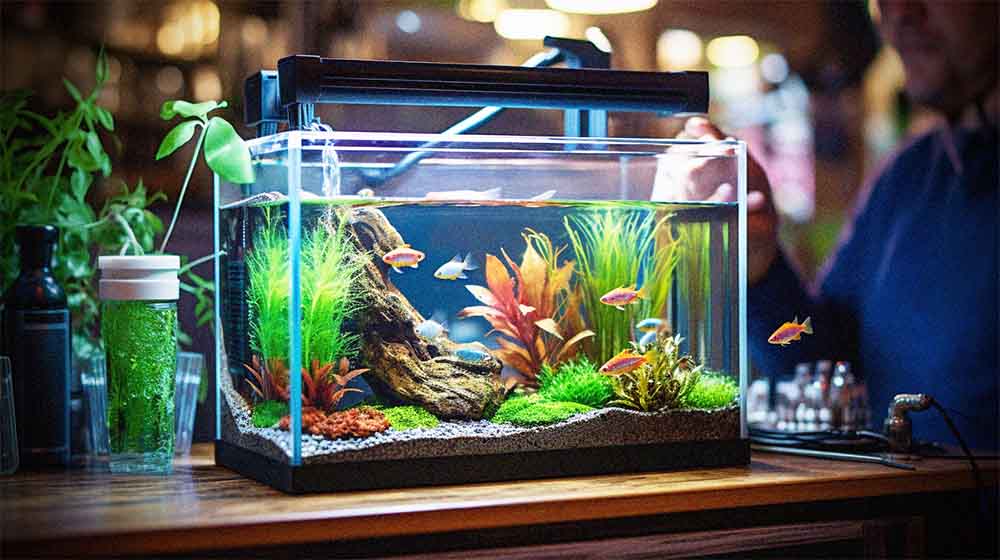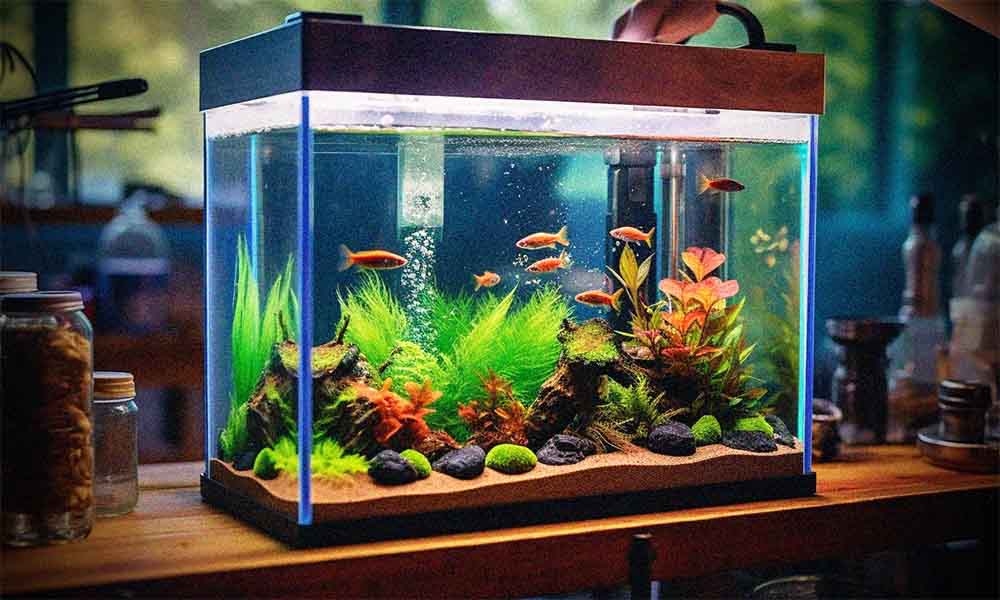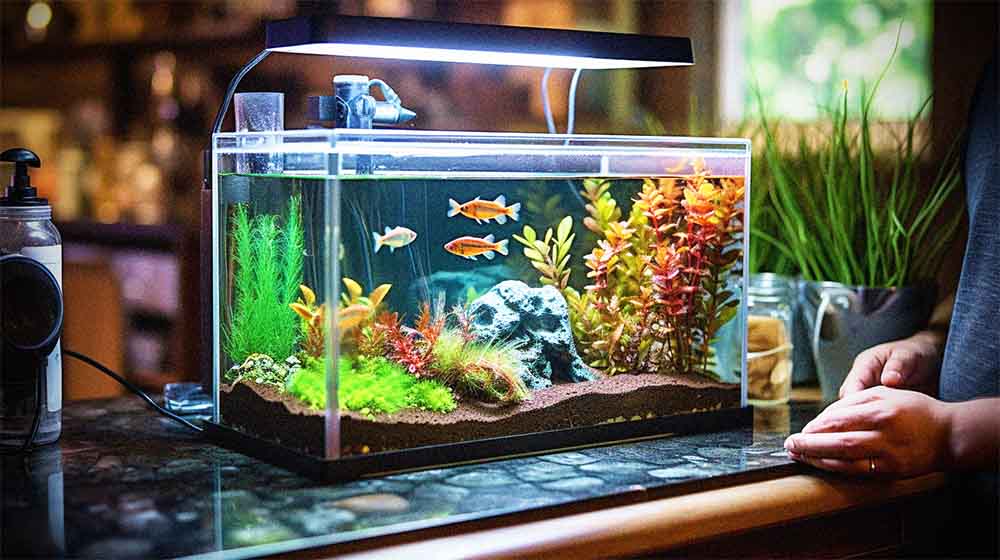Leaving an aquarium unattended for two weeks can leave you worried about how your aquatic friends will fare in your absence.
With some automated systems in place, leaving your tank for two weeks need not be overly problematic.
Let’s look at the pre-departure preparations, such as setting up an automated feeder, providing an adequate heat source, and maintaining proper water quality.
I’ll also cover techniques to minimize algae growth, cleaning filters, and other equipment.
Key Takeaways
- Pre-departure preparations are essential to ensure the well-being of the fish during a two-week absence. This includes securing enough food, stocking supplies, testing water quality, and cleaning the tank.
- Setting up an automated feeder can provide peace of mind and ensure that the fish are adequately fed while you are away.
- Providing an adequate heat source is crucial to maintain the proper water temperature for the fish species, and regular monitoring of equipment is necessary to prevent any damage.
- Maintaining proper water quality is vital for the health and happiness of the fish, including checking pH levels, adjusting salinity, and minimizing algae growth through light control and regular cleaning.
Pre-Departure Preparations for Your Aquarium
Before you leave for your vacation, take all necessary pre-departure preparations to ensure the health and safety of your fish and the tank.
Here are some critical steps to follow:
- Secure enough food to last the duration of your absence.
- Stock up on supplies like water conditioner and fish medicine in case of emergencies.
- Test the water quality before departure.
- Clean out any debris or uneaten food that could contaminate or pollute the tank water during your absence.
- Check that all internal filters work correctly and adjust accordingly before leaving.
And remember to check that the fish tank is at the proper place, avoid direct sunlinght and electronic appliances etc.
Setting Up an Automated Feeder for Your Fish
Setting up an automated feeder can be a great way to ensure your fish get fed while you’re away.
Monitor food levels and stock up on supplies before leaving so that the feeder will have enough food for the duration of your trip.
Here are some tips to help get your automated feeder set up:
- Research different options available and select one that fits your needs.
- Follow the manufacturer’s instructions carefully for installation and operation.
- Test it out by feeding a few times before leaving to ensure it works properly.
- Make sure there’s enough food in the system for the length of time you’ll be away.
An automated feeder provides peace of mind while you enjoy your vacation!

Providing Adequate Heat Source for the Tank
Providing an adequate heat source in their tank is essential to ensure your fish stay healthy. Fish are cold-blooded animals and need a regulated environment to survive.
The best way to do this is by monitoring the temperature of the water with an aquarium thermometer. This way, you can ensure the temperature stays within a safe range for the species in your tank.
You should also consider using a heater or light source that matches their needs. It may take some trial and error to get it right, but it will be worth it once you find what works best for them!
Check your equipment before leaving for any signs of damage that could affect your fish’s health or well-being.
Maintaining Proper Water Quality
Maintaining healthy and balanced water quality is critical for your fish’s survival, so it’s essential to check it regularly.
Monitoring pH levels:
- Check the pH of your tank water frequently using a reliable test kit.
- Regularly adjust the pH level as needed with an appropriate product.
Testing salinity:
- Use a hydrometer or refractometer to measure the tank salinity levels weekly.
- Be sure to use aquarium salt when changing the salinity of your tank water.
Regular maintenance can be time-consuming, but it also ensures that your fish are safe and happy during their stay in your aquarium (and during your trip)!
Minimizing Algae Growth in Your Aquarium
Minimizing algae growth can be achieved with a few easy steps.
One effective method is to reduce the amount of light in your aquarium. Limiting the time lights are on or adjusting their intensity can significantly help control algae growth.
Regularly testing your water is also crucial in staying ahead of any potential problems. Try to identify any issues related to algae growth before they become severe.
Pay attention to basic maintenance tasks such as cleaning debris or scrubbing down surfaces covered with algae. This will help your tank remain healthy for weeks at a time.
Cleaning the Filter and Other Equipment
Regularly cleaning your filter and other aquarium equipment is vital to keeping your tank healthy.
Maintaining balance in your tank is essential for the health of all the inhabitants. To ensure this balance, water changes should be done regularly. This also helps keep the filter and other equipment clean.
Cleaning the filter should be done with an algae scraper or a sponge to remove any buildup of debris or waste that has been collected on its surface.
You may need to replace certain filter parts if they become clogged or damaged over time.
Make sure that all pieces are thoroughly cleaned before being put back together again.

Frequently Asked Questions
What if I don’t have anyone to watch my aquarium while I’m away?
Suppose you don’t have anyone to watch your aquarium while away. In that case, it’s important to choose fish that are hardy and require minimal tank maintenance. This way, the aquarium will stay healthy until you are back home.
What are the risks associated with leaving my aquarium unattended?
Leaving an aquarium unattended carries risks to fish health and water quality. The tank could become toxic without regular maintenance, killing your precious fish. Algae can quickly overgrow, making breathing difficult for your aquatic friends. You must find someone to check on them while you are away for more extended periods to keep them safe.
Conclusion
With an automated feeder, proper heat source, and quality water, I’ve taken the necessary steps to ensure my fish stay happy and healthy while I’m away.
Furthermore, keeping on top of algae growth and cleaning the filter regularly will help keep everything in balance.
By using metaphor to compare taking care of an aquarium to caring for a garden – both require regular maintenance – I’ve been able to successfully prepare for my time away.

